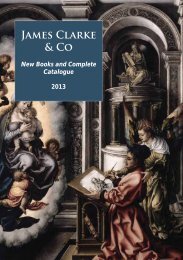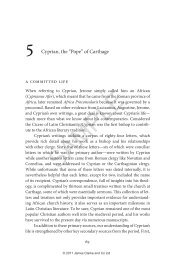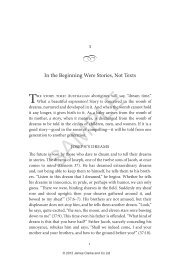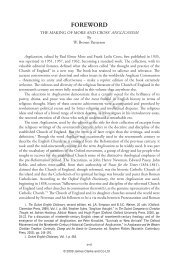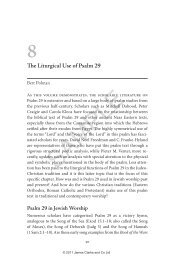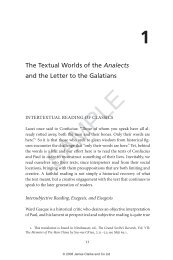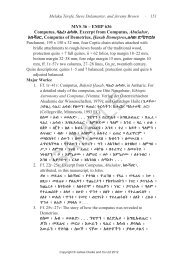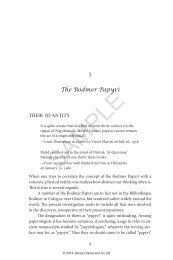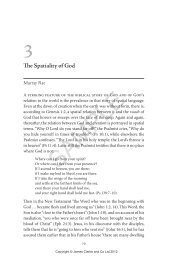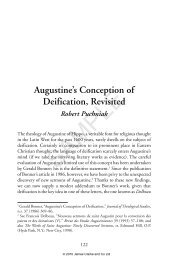Introduction by Kirk R. MacGregor - James Clarke and Co Ltd
Introduction by Kirk R. MacGregor - James Clarke and Co Ltd
Introduction by Kirk R. MacGregor - James Clarke and Co Ltd
Create successful ePaper yourself
Turn your PDF publications into a flip-book with our unique Google optimized e-Paper software.
<strong>Introduction</strong><br />
to the Genevan populace, Calvin made little (if any) effort to defend the<br />
disputed particulars of how he believed predestination operated; this he<br />
reserved for his systematic works <strong>and</strong> theological treatises. Rather, Calvin<br />
focused on the biblical purpose of election <strong>and</strong> its corollaries for daily<br />
life, which exhibit logical independence from his late-Augustinian doctrine<br />
of human freedom <strong>and</strong> therefore may be embraced <strong>by</strong> subscribers<br />
to other predestinary models. In other words, even if one does not agree<br />
with Calvin as to the how of predestination, one should agree with Calvin<br />
as to the why. This why included showing people that they could never<br />
save themselves or act in such a way as to compel God to save them, relieving<br />
believers of the anxiety to be good enough to retain the salvation<br />
they currently hold, guaranteeing the presence of God’s cooperating grace<br />
throughout life, <strong>and</strong> enabling the panoramic perception of God’s providence<br />
spanning one’s past, present, <strong>and</strong> future. Readily understood <strong>and</strong><br />
appropriated on a lay level, Calvin’s doctrine of predestination fostered<br />
a veritable revolution in the morality of the citizens of Geneva, which<br />
was then safeguarded through the institution of the <strong>Co</strong>nsistory <strong>and</strong> its<br />
antithetical relationship between church discipline <strong>and</strong> sacramental<br />
reception. I further amplify the ethical value of predestination through<br />
a case study of the sixteenth-century Huguenot community, which discloses<br />
how the implications of this doctrine supplied the Huguenot spiritual<br />
life-blood <strong>and</strong> sustained their existence during the persecutory Wars<br />
of Religion. Giving the lie to the thesis that the unconditional nature of<br />
Calvinist predestination inevitably spawns worry as to whether believers<br />
find themselves among the elect, Huguenot spirituality considered predestination<br />
as an exhibition of the love God showers upon believers <strong>and</strong><br />
his care for their salvation.<br />
In chapter ten, turning to anthropological concerns, I appraise the<br />
evidential value for eternal security of the necessary changes in human<br />
nature accomplished <strong>by</strong> the Holy Spirit at the moment of regeneration.<br />
Since the Holy Spirit promises to eternally indwell each regenerated believer<br />
<strong>and</strong> seal the believer for the day of redemption <strong>by</strong> making certain<br />
internal changes, I contend that believers can be sure of their salvation <strong>by</strong><br />
apprehending the Spirit within via the sensus divinitatis <strong>and</strong> <strong>by</strong> perceiving<br />
the reality of those changes in their souls. The tenor of the chapter builds<br />
philosophically upon the anthropological categories expounded in the<br />
Pauline corpus, where each individual alienated from God is a yucikov~<br />
a[nqrwpo~ (“soul-ish human,” or a human dominated <strong>by</strong> the selfish desires<br />
SAMPLE<br />
xxviii<br />
© 2011 <strong>James</strong> <strong>Clarke</strong> <strong>and</strong> <strong>Co</strong> <strong>Ltd</strong>



